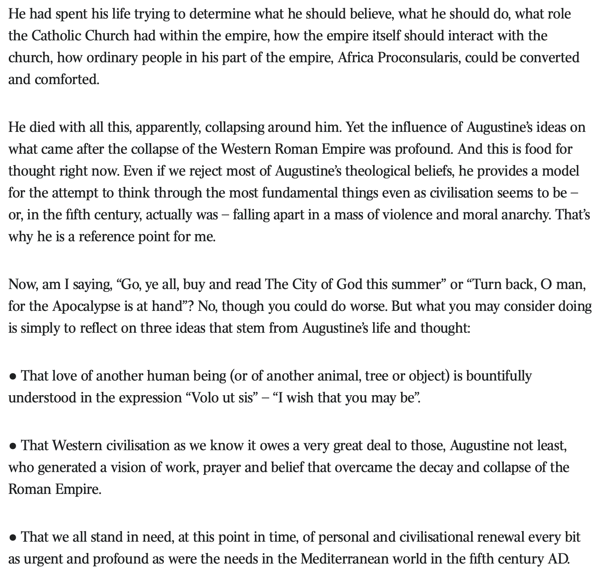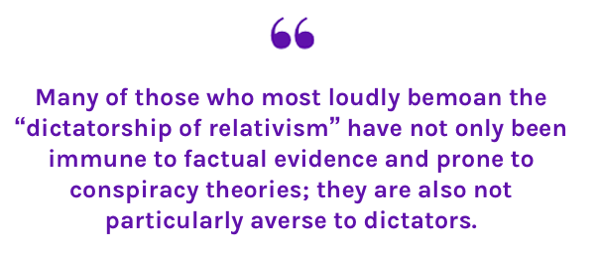| ❝ | That Western civilisation as we know it owes a very great deal to those, Augustine not least, who generated a vision of work, prayer and belief that overcame the decay and collapse of the Roman Empire. |

| ❝ | That Western civilisation as we know it owes a very great deal to those, Augustine not least, who generated a vision of work, prayer and belief that overcame the decay and collapse of the Roman Empire. |

| ❝ | If justice is not based on the facts, if principles of justice are not applied universally, there is no real justice. |
Alice Dreger "Darkness’s Descent on the American Anthropological Association", Hum Nat 2011, pp.243-244.

She expands on in the excellent Galileo’s Middle Finger📚.
| ❝ | If you must write about us, at least give a damn about us, |
Not just “if you write, give a damn”, but about us. This is about community and relationships. She’s tempted to outrage, but she lives there, and “outrage is where relationships go to die.”
Outrage doesn’t get curious about why. It mutes the Principle of Charity. It often reacts to imagined motive more than act. Witness Colin Kaepernick taking a knee.
To be sure, there is plenty of anti-Semitism about, and Maus is charismatic megafauna, worthy of defense. But,
The meeting minutes suggest that their objections to Art Spiegelman’s _Maus_ series had less to do with the subject matter and more to do with a purity narrative _that never seems to die_, no matter the zip code.In a response [Margaret Renki agrees](https://www.nytimes.com/2022/02/07/opinion/culture/maus-tennessee-book-bans.html), wryly noting:
Around here, antisemitism tends to take far more flagrant forms,
The minutes show a board mostly committed to teaching the Holocaust, but deeply uncomfortable making main unit text contain, as Renki summarizes, “profanity, sexuality, violence and… a suicide scene.” They wanted to just fully redact eight words and an image, but were advised that might exceed “fair use”.
That’s like restricting Alice in Wonderland for promoting poison, but as Renki notes, purity culture is universal: my demographic doesn’t mind literary profanity, but we have put two prize-winning classics on the Top 10 Banned Books list, for violating other norms.
Back to Kimball Coe:
| ❝ |
I’ve got to be on the side of holding that together. : If you want to signal to the world that you’re on the side of solutions and repair, then write or tweet as a repairer of the breach. |
Yesterday I commented on a cousin’s post sharing a claim about 9 reported child vaccine deaths. I looked up each death in VAERS and noted two were actually gunshot wounds, 3-5 were special cases, so only 2-4 were notably concerning. I suspect this didn’t help: she quickly deleted my comment.
David Broniatowski says I shouldn’t be surprised. He argues that both debunking and censorship are counterproductive. Remember,
Russian Twitter “troll” accounts weaponized demeaning provaccine messages as frequently as vaccine refual narratives when conducting a broad campaign to promote discord in American society.
What to do instead? The hard work of opening “collaborations with public health partners”, and especially with physicians, who are generally trusted. This is of course harder. And I’m not a physician so that’s out.
The vaccine rollout in the USA has slowed driven, in part, by the fact that the most eager and confident citizens have now been vaccinated. The hurdle now is no longer one of vaccine supply, but rather, demand. In two new editorials, and a podcast, all in the American Journal of Public Health, I make the case that:
- Debunking misinformation is insufficient to convince hesitant people to vaccinate. Rather, we must listen to their concerns and communicate the gist of vaccination in a manner that accords with their values.
- Blanket removal of online content by Facebook, Twitter, and Google/YouTube may be counterproductive, driving hesitant people to seek out information on alternative platforms. On the other hand, social media platforms are excellent tools for microtargeting and can help public health agents to reach people who are the most hesitant. We can use social media, in combination, with traditional methods, to build relationships with the most hesitant people and increase their likelihood of vaccinating.
Together, these strategies can help us cross the threshold of herd immunity to end the pandemic.
Podcast is here. [<- Link may not render, but it works. -ct]
Worth reading in entirety, Alan Jacobs reflects on an essay by Douthat:
Such a system, predictably, was terrible at generating the kind of outward-facing, evangelistic conservatives who had made the Reagan revolution possible.
He ends by saying Antonin Scalia was the sole survivor of the Old Republic, making Amy Coney Barret the Last Jedi.
(OK, Douthat doesn’t use Star Wars. But Sunstein did. I just blended them.)
Where Douthat muses on Trump’s loss, Ian Leslie reflected on Biden’s victory over both Sanders and Trump:
It's worth spending a bit of time on what it means to be moderate.Three forgotten principles of moderate politics that sparkle because they are both obvious and ignored.
Turns out Leslie has a new book, Conflicted:
Disagreement is the best way of thinking we have. It weeds out weak arguments, improves decision-making, leads to new ideas, and, counter-intuitively, brings us closer to one another. But only if we do it well - and right now, we’re doing it terribly.
Looking forward to it. Mercier & Sperber demonstrated that disagreement is how groups think, and that under the right conditions, they vastly outthink people.
For some gentle advice on How to Think, try Alan Jacobs' book by that name. We all cover the philosophy & cognitive science. Jacobs tackles the human component:
[We describe] argument as war ... because in many arguments there truly is something to be lost, and most often what's under threat is social affiliation. [My bold.]
What to do?
6. Gravitate, as best you can, in every way you can, toward people who seem to value genuine community and can handle disagreement with equanimity.
Just re-found this @ayjay essay in an old tab.
The question I would ask churches that are re-opening without masks or distancing, but with lots of congregational singing, is: How do you think infectious disease works, exactly? How do you think COVID–19 is transmitted? What’s the theory you’re operating on?
I still know people using an incoherent mix of, well, all of these:


Sam Rocha, In America Magazine
A touching, real conversation on faith, death, grief, culture wars, the Christmas season, comparative immigration, and briefly, Thatcher on climate. Underneath, kinship.